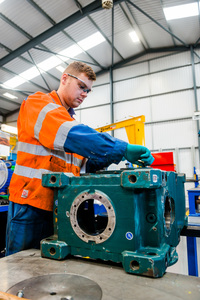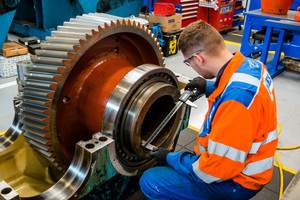
 |
Charlotte Stonestreet
Managing Editor |
| Home> | POWER TRANSMISSION | >Gearboxes | >Controlling the Pitch and Yaw of the gearbox landscape |
Editor's Pick
Controlling the Pitch and Yaw of the gearbox landscape
12 February 2025
Simon Whitehouse explores evolving trends in the gearbox market and how behavior has shifted across various industry sectors

OVER THE last 10 to 15 years, the market for gearboxes and how they are used across industry sectors has changed markedly. Before the financial crisis of 2008 most businesses were risk averse, and kept either on-site or very close at hand a supply of spare parts and equipment to quickly address any failures. However, post 2008 there has been a change in behaviour with many more operators run their plants on a break/ fix basis and then hope for the best in terms of repair and a return to production. This has meant that gearbox repair and replacement specialists, such as ERIKS, are now bought in late in the day to fix what I term as “plant stoppers” - pieces of equipment that people need to operate to re-start production.
Due to the change in market conditions ERIKS’ infrastructure, its manpower, its knowledge and most of all its ability to react quickly are key. This is all a far cry to the practices in the manufacturing industries where 20 years ago they would plan a two-week production break and send us 20 or so gearboxes that needed to be overhauled within that time frame. That volume of units within a small time frame obviously creates its own challenges, but ERIKS was always able to mobilise its manpower in a planned way. The market has changed from those big peaks and troughs to a place whereby we need to be permanently alert because we may be needed to step into a big project at a moment’s notice. The pressure has increased as the timelines have reduced.
Future proofing
While we have seen a large increase in urgent, unplanned projects that’s not to say that every market sector is the same. The onshore side of the oil and gas sector (making hoses etc.) is still good at forward planning and the water industry also falls into that category. One aspect of these industries is that they have become adept at using the stock profile they have held in their business. These are large businesses with significant standby capacity within their assets and therefore if they have a catastrophic failure the likelihood is that they can call on their own equipment and regain production while working with us in the background to repair or overhaul a gearbox that can then be called on later. However, such an approach really depends on where the industry is in its lifecycle at a particular time. The steel industry for example is currently running on a break fix strategy as they run down their old style of production and start to move towards electric furnaces. It’s a complex picture.
One approach which we advocate and have worked with some businesses on is ‘future proofing their plant’. ERIKS’ experts can advise businesses on their potential weak points. Some plants are using gearboxes that OEMs have failed to support for many years and that are not as efficient or easy to repair as more modern equipment. We can advise on the likelihood of a worthwhile, cost-effective repair for those ‘ancient’ pieces of equipment while also helping to source the most up-to-date energy-efficient, electronically controlled replacements. In this capacity ERIKS is an independent voice. As we offer the option of a new gearbox, an upgrade, a repair or an overhaul to the customer, we have a truly unbiased view across the whole problem and advise them which solution best fits their circumstances and crucially their budget.
Changing mindsets
While, as I have said, there are many businesses that do forward plan, more broadly across industry there has been something of a change of mindset as engineers and manufacturers have changed from a ‘belt and braces’ approach to a less cautious mentality and the main driver of this change has been financial. Unnecessary spending is now viewed as ‘the’ cardinal sin and budgetary controls have become, in mine and many people’s eyes, too restrictive. Spending £20 or £30k on a ‘what if’ doesn’t happen anymore and if the ‘what if’ does happen then it's down to a specialist such as ERIKS with its workshops, its logistics expertise and its ability to react quickly that are the key to getting a plant up and running again.
As a product specialist that supports the ERIKS network, I do get asked ‘firefighting ‘questions where a customer asks about a certain process, and you might be able to offer an alternative. The one thing we do is to give the customer options wherever we can. If a unit comes in that is an absolute plant stopper we work through the options: can we do a repair, can we offer a new unit, can we offer an alternative that will future proof the plant? All these decisions are based on the urgency, requirement or legacy of the product involved.
It’s also worth noting that our centrally located facility, just to the West of Birmingham, is an SKF certified repair partner for gearboxes – one of only two such accredited facilities in the UK. It took 2 years to achieve the accreditation which covers both our technical and environmental capability and helps us support our network. ERIKS has also recently achieved a UK first when achieving Maintenance Partner status from SKF. Our experience in becoming the gearbox partner helped with the maintenance partner accreditation. We have a ‘right first time, every time’ attitude alongside ISO9001 and ISO45001 certification – we make no apology for our adherence to stringent quality standards but as we do have a liability when the unit goes to the customer that’s for good reason.
Changing technology
The gearbox sector has changed in the last 20 years, in terms of how customers view their assets, and this has been coupled with a change in technology. In the past mechanical variable speed drives were in abundance but over the years they have been squeezed out of the market due to electronic controllers. This change has had a massive impact both on the market and our business. If we take the water industry for example you might have a triple, quadruple drive unit which means multiples of units bolted together to give you, for example, a gear ratio of 1.5 million to 1! These units were put together in the 1970s and 80s and can be very large, but the replacements are much smaller in footprint, such as the Fenner Cyclo drive. Plus, at the smaller end of the market, say below 30kW, people now view these products as ‘throwaway’ items. With products like 18kW or 22kW inline helical gearboxes these days it's cheaper to buy new than to repair them.
The outlier to this approach is where a customer has some ‘old school’ technology with an old design, and they cannot do (or don’t want to do) plant modifications to use more modern equipment. Perhaps where an old piece of kit has a British standard footprint and all the equipment in the market is for a European standard footprint. The two are different and they don’t bolt together and sometimes, rather than interrupt their production layout, they would rather pay for a specialist repair. In this example they don’t want to change the footprint and would rather keep the old kit in play as opposed to future proof their plant. Again, budgets are key in this decision-making process.
Negotiating the changing landscape
With its fully equipped gearbox repair and test centre at Pensnett and the dedicated, time-served and passionate crew that work there, ERIKS is set fair to negotiate the changing landscape when it comes to gearboxes. With apprentices coming through the business on a year-on-year basis the skills and experience of the ERIKS gearbox team are being passed down the line so that they can support customers and the various industries for a long time into the future.
Simon Whitehouse is gearbox business unit manager at ERIKS UK
- Fenner gearboxes – the byword for reliability
- Prevention is better than cure
- ERIKS launches multi-level reliability service
- Fenner Quattro PLUS Belts from ERIKS deliver 26% more power
- Education key to unlocking I4.0
- UK 'badly underprepared' for Industry 4.0
- Fluid power united
- ERIKS widens scope of apprenticeship intake
- COOL, CALCULATED EFFICIENCY
- Win £5k design time and a Land Rover day with ERIKS
- GEARBOX IS CHEAPER TO REPLACE THAN REPAIR
- PLANETARY/SPUR GEARBOXES
- PLANETARY GEARS WELL SUITED FOR RETROFIT
- AGEING WORM GEARS REPLACED BY PLANETARY GEARS IN SEWAGE PLANT
- REHFUSS BRINGS QUALITY AND VERSATILITY TO GEARBOX DESIGN AND SELECTION
- FLEXIBLE COUPLINGS
- GETTING THE BEST OUT OF GEARBOXES
- A Guide to the Selection
- Greater Corrosion Resistance
- Fits existing parameters





















